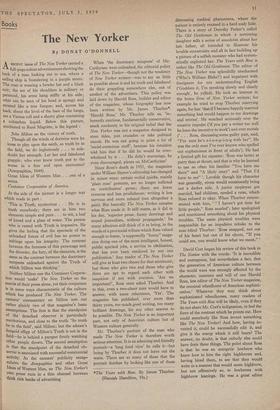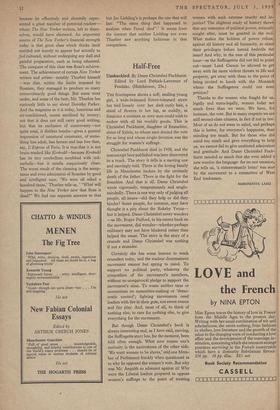Books
The New Yorker
By DONAT O'DONNELL
ARECENT issue of The New Yorker carried a full-page colour advertisement showing the back of a man looking out to sea, where a sailing ship is foundering in a purple storm. The man is wearing a bowler hat and a black suit; the set of his shoulders is military or Paranoid, his arms hang stiffly at his side; what can be seen of his head is spongy and striated like a tree fungus; and, across his back, about the level of the base of the lungs, are a Vienna roll and a sherry glass containing a colourless liquid. Below this picture, attributed to Rene Magritte, is the legend :
Yohn Milton on the victory of truth.
Though all the winds of doctrine were let loose to play upon the earth, so truth be in the field, we do ingloriously . . . to mis- doubt her strength. Let her and falsehood grapple; who ever knew truth put to the worse in a free and open encounter? (Areopagitica, 1644).
Great Ideas of Western Man . . .one of a series.
Container Corporation of America.
At the side of the picture is a longer text which reads in part : 'This is Truth, mysterious . . . He is in truth somebody; there are in him two elements simple and pure . . . to wit, a loaf of bread and a glass of water. The person who is vested with Truth is impassive. He gives the feeling that the spectacle of the unleashed forces of evil has no power to infringe upon his integrity. The contrast between the firmness of this personage and the disorder, the fury, of the elements, is the same as the contrast between the doctrinary tempests unleashed against the Truth of which Milton was thinking.'
Neither Milton nor the Container Corpora- tion would 'make' The New Yorker on the merits of their prose alone, yet their conjecture is in some ways characteristic of the culture which has produced The New Yorker. The canners' commentary on Milton sets out rather plainly two of that magazine's basic assumptions. The first is that the standpoint of the' detached observer is particularly meritorious, and close to the truth. `So truth be in the field', said Milton; but the admen's fungoid effigy of Milton's Truth is not in the field—he is behind a parapet firmly watching other people drown. The second assumption Is that the standpoint of the detached ob- server is associated with successful commercial activity. As the canners' publicity encap- sulates the Areopagitica and other Great Ideas of Western Man, so The New Yorker's own prose runs in a thin channel between thick rich banks of advertising
When 'the doctrinary tempests' of Mc- Carthyism were unleashed, the editorial policy of The New Yorker—though not the tendency of New Yorker writers—was to say as little as possible about it and let truth and falsehood do their grappling somewhere else, out of earshot of the advertisers. This policy was laid down by Harold Ross, builder and editor of the magazine, whose biography has now been written by Mr. James Thurber*. 'Harold Ross,' Mr. Thurber tells us, 'in- herently cautious, fundamentally conservative, stuck resolutely to his original belief that the New Yorker was not a magazine designed to stem tides, join crusades or take political stands. He was not going to print a lot of `social-conscious stuff', because his intuition told him that if he did he would be over- whelmed by it . . . He didn't encourage, he even discouraged, pieces on McCarthyism' Since Ross's death in 1951, the magazine under William Shawn's editorship has changed in minor ways: certain verbal quirks, mainly 'plain man' gestures, are no longer inflicted on contributors' -prose; there are fewer commas and less prudishness ; writing is less nervous and more relaxed (not altogether a gain). But basically The New Yorker remains what Ross made it. It still wants, as it did in his day, 'superior prose, funny drawings and sound journalism, without propaganda.' Its many admirers still think of it as being, in the words of a provincial tribute which Ross valued enough to frame, 'a supposedly "funny" maga- zine doing one of the most intelligent, honest, public spirited jobs, a service to civilisation, that has ever been rendered by any one publication.' Any reader of The New Yorker will give at least two cheers for that sentiment; but those who give two and those who give three are apt to regard each other with suspicion if not with aversion. 'Are we important?', Ross once asked Thurber. And to this, even a two-cheer man would have to answer, with some reluctance, 'Yes'. The magazine has published, over more than thirty years, too much good writing, too many brilliant drawings, for any other answer to be possible. The New Yorker is an important part, not only of American culture but of Western culture generally.
Mr. Thurber's portrait of the man who made The New Yorker is therefore worth serious attention. It is an admiring and friendly portrait—a 'long fond view' he calls it—but being by Thurber it does not leave out the warts. There are so many of these that the portrait finishes by looking like one of those *The Years with Ross. By James Thurber. (Hamish Hamilton, 18s.) distressing medical phenomena, where the patient is entirely encased in a hard scaly hide. There is a story of Dorothy Parker's called The Old Gentleman in which a sorrowing daughter tells a series of anecdotes about her late father, all intended to illustrate his lovable eccentricity and all in fact building up a picture of a selfish monster who had system- atically exploited her. The Years with Ross is rather like The Old Gentleman. The editor of The New Yorker was splendidly uneducated (Who's William Blake?') and impatient with foreigners for not understanding English (`Goddam it, I'm speaking slowly and clearly enough', he yelled). He took an interest in the home lives of New Yorker writers; for example he tried to stop Thurber marrying again, for fear 'that if I became happily married something bad would happen to my drawings and stories'. He watched anxiously over the creative impulse ('if you pay a writer too well he loses the incentive to work') and over morals (' . . . Ross, discussing some guilty pair, said, "I'm sure he's s-l-e-e-p-i-n-g with her". He was the only man I've ever known who spelled out euphemisms in front of adults'). He had a limited gift for repartee: 'Ross was better at parry than at thrust, and that is why he learned to use so often his familiar "You have me there" and "A likely story" and "That I'd have to see" '. Lovable though his character was generally, stress would occasionally bring out a darker side. A junior employee got married, had children, needed a raise, which Ross refused to okay. When Thurber remon- strated with him, ' " I haven't got time for little people," Ross snarled'; later apologised and murmured something about his physical troubles. The same physical troubles were responsible for an impulsive rebuke to the near-blind Thurber: 'Boss snapped, not out of his heart but out of his ulcers, "If you could see, you would know what we mean." ' David Cort began his review of this book in The Nation with the words : 'It is incredible and outrageous, but nevertheless a fact, that the generation of American culture between the world wars was strongly affected by the character, manners and will of one Harold Ross, late editor of The New Yorker magazine, the nominal wheelhorse of American sophisti- cation.' Whatever they may think about sophisticated wheelhorses, many readers of The Years with Ross will be likely, even if they do not share Mr. Cort's indignation, to feel the force of the contrast which he points out. How could somebody like Ross invent something like The New Yorker? And how, having in- vented it, could he successfully edit it, and give it the stamp which it still bears? The answer, no doubt, is that nobody else could have done these things. The point about Ross is that he was an energetic lowbrow who knew how to hire the right highbrows and, having hired them, to see that they would write in a manner that would seem highbrow, but not offensively so, to lowbrows with highbrow leanings. He was a great editor because he effectively and shrewdly repre- sented a great number of potential readers— whom The New Yorker writers, left to them- selves, would have alienated. An important source of The New Yorker's financial strength today is that great class which thinks itself entitled not merely to appear but actually to feel cultured, without undergoing any dull and painful preparation, such as being educated. The conquest of this class was Ross's achieve- ment. The achievement of certain New Yorker writers and artists—notably Thurber himself —was that, within the limits imposed by Rossism, they managed to produce so many extraordinarily good things. But some went under, and some of the best; Mr. Thurber has curiously little to say about Dorothy Parker. And the magazine as it is today, luxurious and air-conditioned, seems sterilised by money; not that it does not still carry good writing, but that its exclusion of controversy—not quite total, it dislikes bombs—gives a general impression of unnatural constraint, of some- thing less adult, less honest and less free than, say, L'Express of Paris. It is true that it is not brain-washed like Krokodil—because Krokodil has its tiny cerebellum scrubbed with red- carbolic—but it smells suspiciously clean. The worst result of the cleaning is the accep- tance and even admiration of Rossism by good and intelligent men. 'We were all asked a hundred times,' Thurber tells us, ' "What will happen to the New Yorker now that Ross is dead?" We had our separate answers to that but Joe Liebling's is perhaps the one that will last: "The same thing that happened to analysis when Freud died"? It seems from the context that neither Liebling nor even Thurber saw anything ludicrous in that comparison.































 Previous page
Previous page